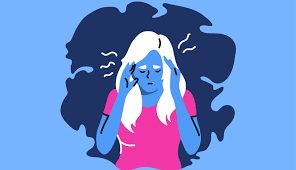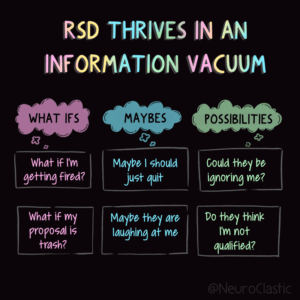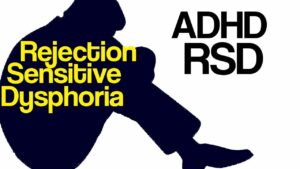Contents
What Is RSD/ADHD?

Most individuals with ADHD are also highly sensitive to what others think or say about them. This is sometimes known as rejection sensitivity dysphoria (RSD). It is not a medical diagnosis but a way of describing certain symptoms related to ADHD. RSD/ADHD can be triggered by an event that would not bother most people but brings out significant emotional distress in individuals with ADHD. For example, if a child with ADHD does not receive an award at school they might see it as though everyone in the room is criticizing them and fails to understand they simply didn’t win any awards.
RSD/ADHD is a neurological disorder that affects the executive functions of the brain. This can lead to problems with focus, attention, organization, and memory. The signs and symptoms of RSD/ADHD can vary from person to person, but many people with the disorder will experience difficulty staying on task, being easily distracted, and fidgeting or squirming in their seats.
RSD/ADHD is usually diagnosed based on a person’s symptoms and history of problems in school or work. There is no one-size-fits-all treatment for RSD/ADHD, but common treatments include therapy, medication, and lifestyle changes. Prevention or reducing the severity of RSD/ADHD attacks can be done through stress management, controlling caffeine intake, and maintaining a healthy diet. There are also many misconceptions about RSD/ADHD that surround it. Some parents believe that ADHD is an excuse for bad behavior while others think it’s not real. There are many resources available both on and offline to help people with RSD/ADHD and their families.
Signs and Symptoms of RSD/ADHD
 Attention problems – Difficulty staying focused and paying attention to details; maybe hyperactive (overly active). Problems with following instructions accurately or finishing tasks such as homework, chores, or duties in the workplace.
Attention problems – Difficulty staying focused and paying attention to details; maybe hyperactive (overly active). Problems with following instructions accurately or finishing tasks such as homework, chores, or duties in the workplace.
Forgetfulness – Difficulty remembering things like assignments, school schedules, where items are kept, and appointments.
Problems with the organization – Difficulty keeping track of things such as pencils, books, backpacks, or assignment notebooks. Frequently losing items needed to complete tasks or activities at home and school.
Poor impulse control – Acting without thinking; difficulty controlling emotions and behavior; problems managing anger. Impulsivity can often lead to unsafe behaviors such as talking without thinking of the consequences of making decisions that could lead to accidents.
The trouble with working memory – The ability to remember and focus on what you’re doing from one moment to the next. Kids with ADHD have difficulty storing new information in their memory banks for later use. Because of this, kids forget instructions and have trouble following multi-step directions.
More symptoms of ADHD
- Difficulty staying focused or on task
- Difficulty taking instructions in the classroom or at work
- Restlessness
- Fidgets
- Squirms when sitting still
- Trouble listening
- Lack of organization
- Problems with follow-through
- Easily distracted
- Frequently losing things
- Disorganization Frequently changing activities
Symptoms of ADHD can begin in early childhood but are usually recognized in school-age children. They are often seen in more than one setting, such as home and school. More boys are diagnosed with ADHD than girls, but research has shown that the disorder affects people of all ages at nearly the same rate.
There are many resources available to help parents of children with ADHD. A parent can ask their child’s teacher for a referral, which will often lead to a free or reduced-cost evaluation from a psychologist. This evaluation usually consists of testing and sometimes includes interviews with parents and teachers. Parents of children with ADHD have asked for more training for teachers on how to handle a child with ADHD. They have also asked for more parent education programs on how to deal with a child who has ADHD and behavior management techniques.
Causes Of RSD/ADHD

There is no one cause of RSD/ADHD, but it is believed to be caused by a combination of genetic and environmental factors. Some researchers believe that exposure to lead or other toxins can increase the risk of developing ADHD, while others think that changes in the brain structure may be responsible. There is also evidence that ADHD may be caused by problems with the way the brain processes dopamine.
Genetic Factors
Genetic factors are believed to play a role in RSD/ADHD. Studies have shown that ADHD is more common in families where there is a history of ADHD, mood disorders, or addiction. This suggests that there may be a genetic link to the disorder. However, it is important to note that not everyone who has ADHD in their family has the disorder themselves.
Environmental Factors
Exposure to toxins or lead, premature birth, and complications during pregnancy may increase a child’s risk of developing RSD/ADHD. However, this relationship is not fully understood. Researchers also believe that brain injuries from early trauma may increase a person’s risk for RSD/ADHD.
Diagnosis of RSD/ADHD
The diagnosis of ADHD is often difficult because the signs and symptoms vary from person to person. The Diagnostic and Statistical Manual (DSM) of Mental Disorders is used to identify the signs and symptoms. ADHD can be diagnosed in children if they display six or more of these behaviors for at least six months:
Inattention – has a hard time staying focused on tasks, often makes careless mistakes Disorganization – problems getting and organizing tasks and activities Hyperactivity – squirming, fidgeting, problems staying seated Impulsivity – difficulty taking turns or waiting for a turn
The DSM also states that ADHD is not solely based on these behaviors. The criteria above do not always mean that a child has ADHD. They are only used to determine if the child should be thoroughly evaluated by a psychologist or psychiatrist for a formal diagnosis.
Once a child is diagnosed with ADHD, he or she will be almost completely managed by the family and/or school in which they live. The most common medications prescribed for ADHD are methylphenidate (Ritalin) and dextroamphetamine (Dexedrine).
Treatment Of RSD/ADHD

There is no one-size-fits-all approach to the treatment of RSD/ADHD. Treatment plans should be tailored to the individual child’s needs and may include a combination of medication, behavioral therapy, education, and support services.
Medication
The most common medications prescribed for RSD/ADHD are stimulants such as methylphenidate (Ritalin) and dextroamphetamine (Dexedrine). These medications help to control the symptoms of ADHD by increasing dopamine levels in the brain. They are safe and effective when used properly, but they should not be taken without medical supervision.
Behavioral Therapy
Behavioral therapy is another important part of treatment for RSD/ADHD. This therapy can help your child learn how to identify and effectively manage his or her own emotions, as well as recognize the impact of their behavior on others.
Education
Children with ADHD require special education services in school. The child’s individualized education program (IEP) should be designed to meet their specific needs in a way that is most conducive for their success in the school environment. The goals of an IEP should be developmentally appropriate and measurable, and the child’s progress toward meeting these goals should be monitored regularly by teachers and parents.
Support Services
There are different support services that may be helpful to children with ADHD including parenting classes, peer relationships clinics, and group homes.
Preventions Tips Of RSD/ADHD

There are various ways to prevent RSD/ADHD from developing. Some of these tips are:
- Make sure that you get enough exercise and stay active. Exercise helps to keep your body and mind healthy and can help to prevent RSD/ADHD from developing.
- Eat a healthy diet and avoid processed foods. Eating unhealthy foods can contribute to the development of RSD/ADHD.
- Get plenty of sleep. Getting enough sleep is important for your mental health and can help to prevent RSD/ADHD from developing.
- Manage your stress levels. Stress can contribute to the development of RSD/ADHD. Practice stress-relieving techniques such as yoga, deep breathing, exercise, listening to music or spending time with friends.
- Make sure that you get enough vitamin D by getting adequate sun exposure at least once a week.
- Try to stay positive and maintain a good attitude. Maintaining a positive attitude can help prevent RSD/ADHD from developing. Stay away from negative people who may try to bring you down.
- Remain involved in your community and social life. Participating in community activities can be very rewarding and can help prevent RSD/ADHD from developing.
- Reduce your intake of caffeine, nicotine, and alcohol as these substances are the ones that contribute to the development of RSD/ADHD.
- Reduce your intake of artificial sweeteners, aspartame, and MSG as these substances contribute to the development of RSD/ADHD.
- If you have a family history of RSD/ADHD, make sure that you eat a healthy diet and get enough exercise during childhood to help prevent RSD/ADHD from developing.
Avoiding Trauma

There are some other factors that may help prevent RSD/ADHD, such as avoiding physical and emotional trauma, such as accidents and injuries. It is very important not to become involved in abusive relationships or experience psychological stress or depression. However, while it is good to be aware of what you should avoid, it is equally as important to know what you can do to help prevent RSD/ADHD from developing. For example, engaging in physical exercise and eating a healthy diet (see the points above) helps to reduce the risk of developing RSD/ADHD.
Spending Time In Sunlight
Another factor that helps prevent RSD/ADHD is spending time in the sun. Spending at least 20 minutes in the sun helps the body to produce vitamin D, which also help prevent RSD/ADHD from developing.
Keeping Positive Attitude
A good attitude and maintaining a positive outlook also helps to prevent RSD/ADHD from developing. People who maintain a healthy lifestyle and have a positive attitude are less likely to develop RSD/ADHD.
In addition, the following lifestyle choices may also help prevent RSD/ADHD from developing:
Eating a healthy diet and taking supplements, staying active and getting plenty of sleep, managing stress levels, and participating in community activities. A positive attitude is also a very important factor in preventing RSD/ADHD.
The above tips are just suggestions, but they surely help prevent RSD/ADHD. Other people may have different lifestyle choices that help them to cope with their RSD/ADHD symptoms. While other people may find taking supplements beneficial, other people find that doing so makes little to no difference. Other people may find that eating a healthy diet helps, but other people may find this makes little to no difference in the way they cope with their symptoms. It is important for you and your loved ones to know and understand what works for you and what does not work for you as we are all different.
What also helps one person may not necessarily help somebody else with RSD/ADHD, but it is important to be aware of what you can do to help yourself. Motivational counseling could also help to promote well-being in individuals who are suffering from mental health problems such as RSD/ADHD.
Conclusion
It is important to be aware of the symptoms and treatment for this disorder. If you or someone close to you has been exhibiting these symptoms, it may be time to seek professional help. It’s never too late! The sooner a person with RSD/ADHD begins receiving appropriate care and support, the more likely they will experience positive outcomes in their daily lives.
If you are looking for affordable Online Counseling MantraCare can help: Book a trial therapy session


